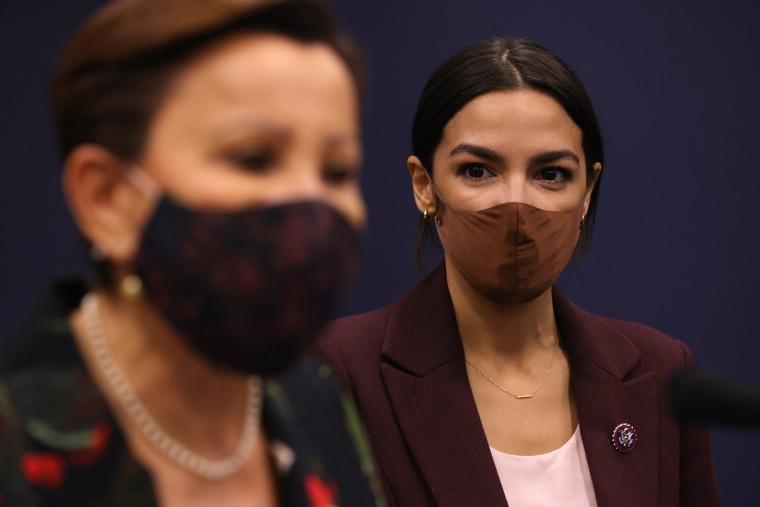Democrats in Congress introduced legislation Thursday to get the ball rolling on determining Puerto Rico's future status, including possible statehood, and its relationship with the mainland.
The measure, the Puerto Rico Self-Determination Act of 2021, calls for creating a "status convention" made up of delegates elected by Puerto Rican voters. The delegates would be responsible for coming up with long-term solutions for the island's territorial status — statehood, independence, a free association or other options beyond its current territorial arrangement.
Bob Menendez, D-N.J., who introduced the measure in the Senate, said the delegates would hold formal talks "with a bilateral negotiating commission" of several members of Congress and other federal officials. Options would be "put before the people of Puerto Rico to vote in a federally recognized referendum for the first time," Menendez said during a news conference.
Most Puerto Ricans favor statehood or some form of its current territorial status. But historically, the island's chances to explore independence as an option were limited, especially during the Cold War, when Puerto Rico was of strategic importance to the U.S. and the nation's military.
Rep. Alexandria Ocasio-Cortez, D-N.Y., who introduced the House version of the bill along with Rep. Nydia Velázquez, D-N.Y., said the measure is as much about allowing Puerto Ricans to assert their political identity as it is "about the identity of the United States."
"If we want to consider ourselves a democracy and live up to our values, it is fundamentally incompatible for an open democracy to have subjects," Ocasio-Cortez said.
Puerto Ricans living on the island are U.S. citizens but don't vote in presidential elections. They don't pay federal income taxes, because they don't have voting representation in Congress. But they do pay payroll taxes, helping fund federal programs like Medicaid, Supplemental Security Income, the Supplemental Nutrition Assistance Program and the Earned Income Tax Credit, which are often lifelines in a territory where 44 percent of the population lives in poverty. But as a U.S. territory, Puerto Rico has unequal access to the programs compared to states.
"A colony is incompatible with democracy, it's incompatible with full citizenship, and we should all be able to enjoy the right to vote for our leaders," Ocasio-Cortez said. "We should all be able to enjoy the right to equal treatment, and self-determination is how we can accomplish that in a process that is respected by all."
Velázquez and Ocasio-Cortez introduced a similar version of the bill last year with 20 Democratic co-sponsors in the House. The new version counts over 70 Democratic co-sponsors; the Senate version has seven co-sponsors, all of them Democrats except for Roger Wicker, R-Miss.
The bills are alternatives to pro-statehood legislation introduced this month by Rep. Darren Soto, D-Fla., and Del. Jenniffer González, Puerto Rico's Republican nonvoting resident commissioner in Congress. That measure has 58 co-sponsors — 13 Republicans and 45 Democrats. A version of the bill introduced in the Senate this week by Martin Heinrich, D-N.M., has three other Democratic co-sponsors.
Congress has come under renewed pressure to act a nonbinding referendum in November that directly asked voters whether Puerto Rico should immediately be admitted as a state. With nearly 55 percent voter turnout, about 53 percent of Puerto Ricans who voted favored statehood, while 47 percent rejected it, according to Puerto Rico's Elections Commission.
In a statement Thursday, González accused supporters of the self-determination legislation of trying to "silence the majoritarian vote and the will of the people of Puerto Rico."
"It should be up to the people, through their vote, to determine their future," said González, who is also a leader of the local political party in Puerto Rico that promotes statehood. "This is not what the bill introduced by Velázquez and Ocasio-Cortez does, which instead ignores the will already expressed by our people and intends to impose their own views upon us."
Velázquez said there were two key differences between the self-determination legislation and the pro-statehood measure.
The Puerto Rico Self-Determination Act would create a binding process that obligates Congress to act on the will of the Puerto Rican people and "respects the rights of the minority in Puerto Rico to be able to participate in a broad, democratic, and transparent inclusive effort," Velázquez said.
Puerto Rico has held a few other referendums in recent years, all federally nonbinding.
In a 2017 plebiscite, 97 percent of those who voted favored statehood, but opposition parties boycotted the vote, resulting in a record low turnout of 23 percent. In a 2012 plebiscite, 61 percent of voters sided with statehood, but the referendum was mired in controversy over how the choices for voters were phrased.
In hand with the plebiscites, similar versions of the Soto-González statehood bill have unsuccessfully been introduced in Congress since at least 2015.
Follow NBC Latino on Facebook, Twitter and Instagram.



